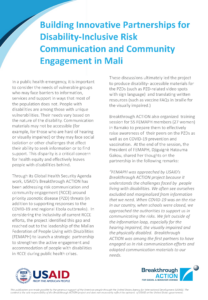In Mali, Breakthrough ACTION recognized the urgent need to ensure inclusivity in risk communication and community engagement during public health crises, particularly for people with disabilities. This success story describes how the project partnered with the Malian Federation of People Living with Disabilities to develop tailored communication materials, including videos with sign language and braille vaccine FAQs to address the unique needs of this vulnerable group. Training sessions for federation members empowered them to raise awareness about priority zoonotic diseases and COVID-19 prevention and vaccination within their communities. This collaborative effort provided vital information to previously marginalized groups, contributed to reducing exclusion, and helped uphold the rights of people with disabilities. This partnership signifies a significant step towards enhancing disability inclusivity in risk communication and community engagement efforts in Mali.
Building Innovative Partnerships in Mali for Disability-Inclusive Risk Communication and Community Engagement
You are here: Home1 / Resource Library2 / Building Innovative Partnerships in Mali for Disability-Inclusive Risk...
Web Policies | Sitemap | Contact Us
This website is made possible by the support of the American people through the United States Agency for International Development (USAID). The Breakthrough awards are supported by USAID’s Office of Population and Reproductive Health, Bureau for Global Health, under Cooperative Agreements: #AID-OAA-A-17-00017 and #AID-OAA-A-17-00018. Breakthrough ACTION is based at the Johns Hopkins Bloomberg School of Public Health’s Center for Communication Programs. Breakthrough RESEARCH is based at Population Council. The contents of this website are the sole responsibility of Breakthrough ACTION and Breakthrough RESEARCH. The information provided on this website is not official U.S. Government information and does not necessarily represent the views or positions of USAID, the United States Government, Johns Hopkins University, or Population Council.
© Johns Hopkins University. All rights reserved.


